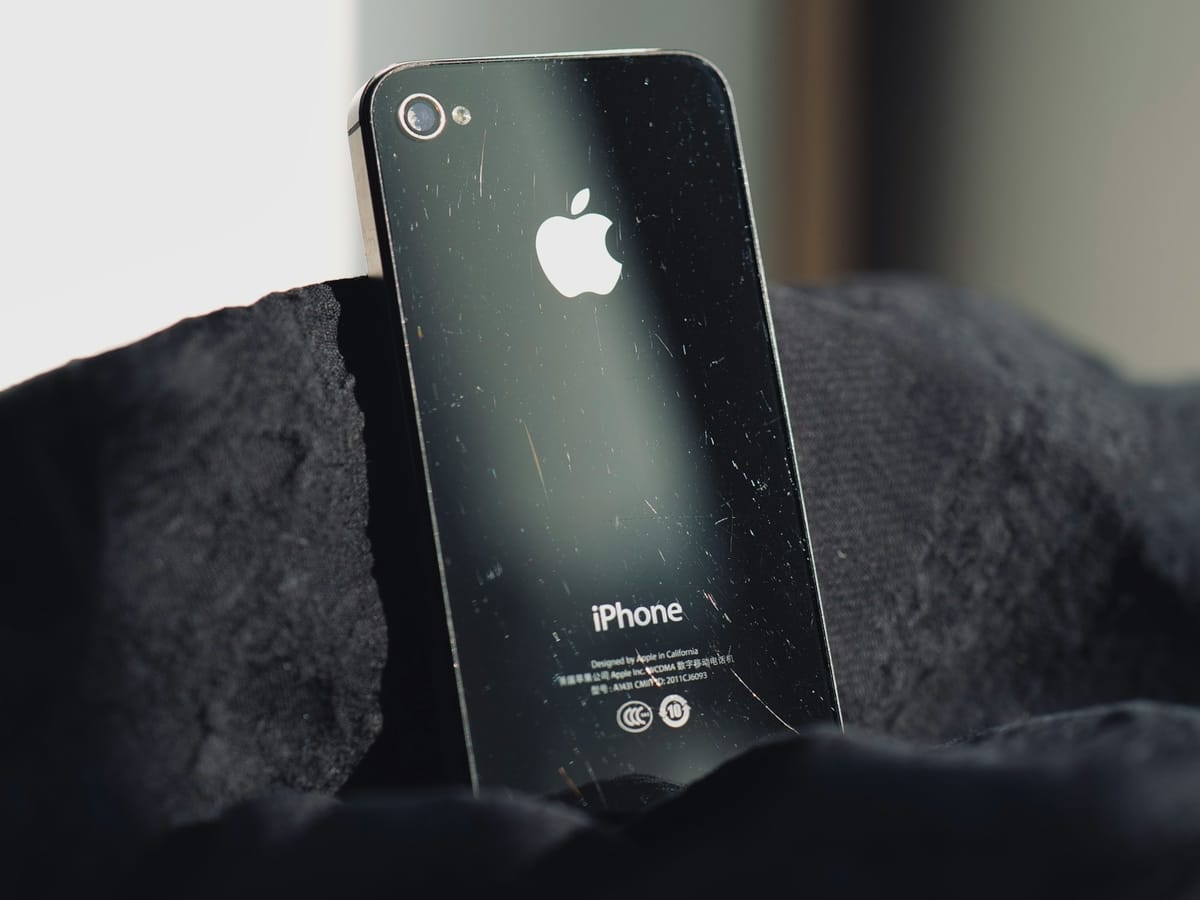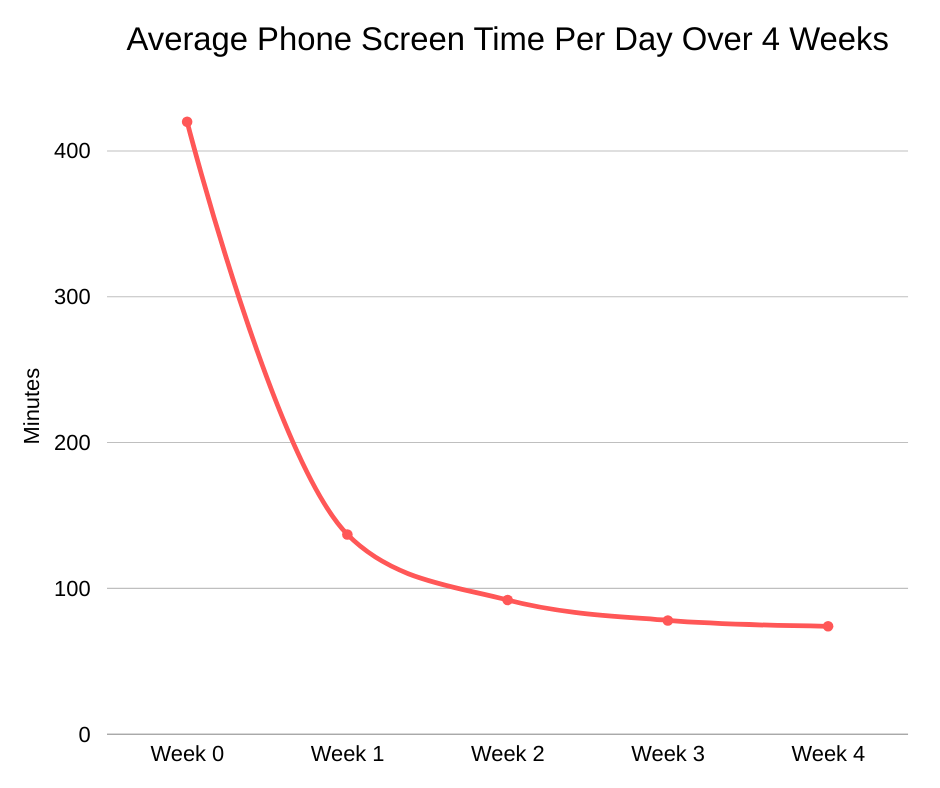Cutting Out (Final Part)
Final part of Cutting out my phone addiction

I did it!! I broke up with my phone! (I think)
In the past 5 weeks, I started a Cutting Out Phone Addiction challenge, based on The Guardian's Reclaim Your Brain newsletters.
I recognised my problem, which was losing time to the world in my phone and the interwebz and neglecting the real life around me. I've done some form of "reset" like Cal Newport's 30 Day Digital Declutter some time ago, but they didn't stick. My hope this time, was to get my life back on track.
Anyway, this time, I only set 2 realistic goals:
- Less than 1 hour average phone screen time per day ❌
- Mindful use of Social Media (No doom-scrolling) ✔️
I didn't accomplish goal one, as it is. However, I'm still proud of what I achieved because I reduced my Phone Screen Time per day from 7 hours to 1 hour 14 minutes, or 82.4%! For the data nerds, check my chart out:

I mean, it's easy when you identify your problem app (cough Instagram) so I banished the app from my phone and only downloaded it when I needed to use it which - let's face it - was rarely.
I marked goal two as a success because I was able to, almost at the end of the challenge, spend less time on social media (even on my laptop) as I filled my time with other activities.
Decentering the Smartphone
The first important step was to decentre the smartphone from my life. It is, at the moment, a pretty indispensable tool that takes centre stage in almost every aspect of life. During the challenge, I was made aware that I use my phone for many of my everyday tasks such as accessing membership e-cards, discounts, cashbacks, e-vouchers by the government and my ID; communicating with friends and family, ordering food, getting to places using maps, completing work administrative tasks, ordering items, and banking.
I began decentering my phone by not grabbing it in my "empty" time, such as during commutes to and from work. I tried to find alternatives like bringing my physical ID with me, ordering food at a kiosk or in-person, memorising how to get to places before I head out, and buying things physically from shops where possible.
I tried my best to do tasks without my phone.
Withdrawals
Kicking any form of addiction will always come with withdrawals.
Of course, I found some alternatives to my social media addiction. Even when the apps are out of my phone, I still could access them through my desktop. I resolved this, at the end, by giving myself some time to look through my social media accounts. I usually started with checking messages, and then by scrolling. I caught myself doom-scrolling a couple of times, and then had to time myself to snap out of it.
At the beginning of the challenge, I still tried to entertain myself during those "empty" times using my phone. Since listening to podcasts or watching youtube on the TV while having dinner did not contribute to my phone's screen time, I did those to fill my time. Eventually I phased them out by trying to complete sudoku or picking up paperbacks from the library to read during my commute and having my dinners without entertainment.
Anxiety
My primary anxiety about leaving my phone behind was "what if something bad happens?" So I started small: leaving my phone while I was headed to the restroom. I'd be away for 5 to 10 minutes at max. Then I went for bigger goals such as heading to lunch outside the home without my phone, then to the library for a couple of hours. Nothing bad, thankfully, has ever happened during those times. It has helped to reduce the anxiety of not having the latest news about anything, and reduced the need to look at my phone every few minutes for absolutely no reason.
Impulse
In a world where you get everything in an instant, it's quite a rude shock to ask myself to hold my impulses. I had to train my patience. Having things readily available (answers to questions, food to order anytime of the day, new and novel content streamed 24/7) has made us less capable of just the good old waiting. I found myself irritated that I had to wait 3 days for my shopee purchases. I could, literally, go to a physical store to purchase the items given the number of shopping malls scattered around Singapore. I might be deterred too, because the price would be higher and might allow me to rethink my intended purchase.
The lack of shopping apps plus adding a rule that I had to make purchases on a big screen (like a laptop) has slowed down my impulse to purchase things and being more thoughtful about each of my purchases. I have also added the 3-day rule recently, where I have to consider the item for 3 days before finally making the purchase.
Noise
One of the practices I adopted was to do one thing at a time. Which meant focusing on the task at hand - driving without the radio, dining without watching a video or the tv, commuting without listening to music or podcast.
I became aware of the environmental noise. General urban noise, at every time of the day. It was inescapable. SO MUCH NOISE!
And the damn vibration of my phone every time a notification comes in! I cut out notifications from everything except WhatsApp, phone and my banking apps.
Meditation, Focus and Awareness
I started guided meditation more frequently as one of the practices of the challenge. But meditating has indirectly helped me to focus more, especially in places with lots of noise and movement.
I used to be unable to read in the bus because it would give me a headache. I'm still not sure if it's due to the motion of the bus, or the noise. But now I'm able to read and retain what I read in buses and even in loud spaces like the cafe I work at.
I am also much more observant and aware of my environment, so everything that I'd been avoiding has come to the forefront of my brain. Things like getting this blog/site to take off, writing in my journal consistently, BIG feelings that need to be addressed, the mess around my room (and in my mind), and more. I can't hide from them anymore! AAAGH.
Breaking from the Algorithm
Back before algorithms tell us which next movie to watch, which next product to purchase, which next book to read or which next person to follow, we used to either listen to recommendations from a friend, read comments or just browse until we find THE one.
I started watching movies based on whatever my sister was watching or whatever was available in cinemas. I borrowed books by reading the blurbs on the back cover, instead of perusing goodreads or the algorithm by NLB based on my borrowing history.
I discovered some book genres that I would not have thought to read, let alone continuing to completion. I think this also helped me to get through books that may seem a bit dry at the beginning and prove to be good in the end. This probably ties in with focus, where we tend to read things that capture our attention, or works that are already based on what we believe in. It's probably good to have your perception challenged once in a while.
Speaking of breaking from the algorithm, maybe it's a good thing to get lost. At one point in the past month, I panicked when I got lost driving in a place that I used to be familiar with, that I ended up using google maps to lead me home. But it wasn't like I needed to be home by a certain time. I had time to get home. I could have just gotten a little lost and explored the neighbourhood a little.
So maybe I should just explore and get lost... again. (I mean this is Singapore, it's difficult to get lost)
Etc.
I did not pick up some of the practices suggested like doing a phone sabbath and a 24-hour digital lockdown. I may do them at some point in my life, but it's a little difficult now as I'm in a long-distance marriage and I need to talk to my husband!
Speaking of which, I started memorising my husband's phone number! Hehe. It's actually a little harder because his has more digits in them than mine.
I have found that I can't do "nothing" like I used to as a child. I can't let my mind wander and if I do, it feels very "wasted" and "unproductive". Maybe that's why I was constantly on my phone - to feel something. ANYTHING. To feel like I haven't wasted my "nothing" time. But we know damn well that the time spent on doom-scrolling is basically nothing. These days, I fill that "nothing"-ness with reading. Is it better? I don't know.
What I know now is that I'm much better at handling crisis these days. I rarely spiral into depths of rumination these days when something happens. And when I do spiral, I can catch and stop myself from doing so. Part of my dealing with BIG feelings.
I have also learned that I can do hard things. I just need to show up, and that is usually the hardest part of doing hard things.
Also, my phone battery lasts longer now! Because I don't use it as often, the battery doesn't drain as quickly as it used to and I no longer need to bring a portable charger. A full charge can last me the whole day!
This is not the end... I know it isn't. It might seem so trivial to lots of people, but this is a major pain for quite a lot of people. I'm so glad I did this, because it's been a wonderful opportunity to rethink my life and time on earth.
And so I broke up with my phone, and I intend to keep it that way.